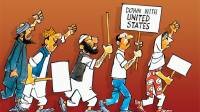Prayers on a Sunday morning turned into a nightmare when two suicide bombers detonated their explosives as worshipers streamed out of the historic All Saints Church in Peshawar. The enormity of the attack was evident from its appalling number of victims: 83 dead and more than 140 wounded. All the victims had one thing in common: Faith.
Pakistan already has a grim record when it comes to protecting religious minorities. But the terror attack in Peshawar jolted the nation due to its massive scale. It was particularly unnerving as the bombings struck at a time when leading politicians were singing the mantra of peace talks with militants.
Christians, who make up about four percent of the country’s 190 million population, have faced intimidation and persecution for decades. The controversial blasphemy laws of the country have particularly targeted them, sowing a deep sense of insecurity.
“The choice of All Saint Church as a target is significant,” said Yaqoob Khan Bangash, the head of History department at Lahore’s famous Forman Christian College. “All Saints is an Anglican church, built in 1883, at a time when Christianity was being indigenized,” Mr. Bangash said. “Its architecture resembles a mosque to reflect an intermingling of cultures and to show that we are not too different.”
However, with the symbolization of similarity of cultures and faith now inhumanly attacked, Bangash expressed skepticism about the future of the Christian community, which, he said, has contributed immensely in health and education sectors of the country, as many missionary schools and hospitals are run by Christians and cater mostly to Muslims.
“Questions will come up now that why are Christians opening up more schools if the same people will kill them?,” Bangash, sitting in his office, cluttered with books on politics and history. “Why are convent nuns teaching Muslim students when their relatives are killing them?”
Michelle Chaudhry, the president of the Cecil and Iris Foundation, expressed a similar view.
Michelle hails from a prominent Christian family and is the daughter of Cecil Chaudhry, a former Pakistan Air Force officer and decorated war hero. Her non profit foundation works on the welfare of minorities in Pakistan and aims to eradicate religious discrimination.
“You see so many good schools and hospitals are run by Christians,” Ms. Chaudhry said. Pakistan Railway and the Post Office were once run by non-Muslims. There has been phenomenal contribution by Christians.” The Christian community in the country was peace-loving and yet targeted by violence, she lamented.
Ms. Chaudhry was close friends with Shahbaz Bhatti, a Christian minister for minority affairs who was gunned down in 2011 Islamabad outside his residence due to his outspoken criticism of the blasphemy laws. “He was like a son to my father,” she said. Bhatti remained a strong opponent of the blasphemy law and continued to raise voice against them despite threats and paid for his life.
Another vocal critic of the blasphemy law, Salmaan Taseer, the former governor of Punjab, was also assassinated by his personal security guard in Islamabad in 2011. Taseer had also actively advocated for the release of Aasia Bibi, a Christian woman who had been sentenced under the laws.
“We need more leaders like them,” Ms. Chaudhry said. But acknowledged a grim fact of the Pakistani society. “They so blatant in silencing any voice against persecution,” she said referring to extremist Islamic militants.
Under the constitution of Pakistan, non-Muslims cannot contest as president or prime minster. Common stereotypes include associating Christians with jobs of sanitary workers, as expressed recently by the Chief Minister Pervez Khattak of Khyber Pakhtoonkhwa province, when he said that he Christian community should retain their “traditional” jobs. At a personal level it gets worse, with some people even refusing to shake hands with or sharing food with Christians.
Chaudhry said that Christians in Pakistan were still struggling for equal rights even though the ancestors had shed blood for the country and defended borders, like her father. She said even the founder of the nation, Quaid-e-Azam Ali Jinnahin historic speech on August 11, 1947 stated: “You are free to go to your temples, you are free to go to your mosques or to any other place or worship in this State of Pakistan.”
Chaudhry said Christians had contributed a lot to Pakistan and were determined to stay in the country. “Your faith is secondary and personal and the state should have nothing to do with it,” she said.
Political analysts say violence at the time of partition in 1947 has left a deep scar on the national psyche.
“The wave of violence on religious minorities has its roots in the inception of Pakistan,” said Bangash, the history teacher. “Muslims could not live with Hindus even though they lived together for thousands of years, and in effect, it is a level of intolerance.”
If a country is born in violence and it is intrinsic to the foundation, then violence becomes part of the country’s nature, he said.
Bangash said the first victims of intolerance and segregation were Ahmadis, who were declared non-Muslim by Zulfiqar Ali Bhutto’s government in the 70s. “If you look at the Pakistan Penal Code, the laws against Ahmadis are worse than Apartheid in South Africa.”
“By the 70s, Bhutto’s anti western rhetoric was that Christians represent the West,” said Bangash. “Schools and convents were attacked because people thought they were foreigners and not loyal to the country.”
It got even worse in Gen. Ziaul Haq’s time when time a poisonous narrative was propagated that anyone who is not a Muslim is not a citizen of Pakistan but an implant from the West. Christians were not the only victims. Violence and discrimination against Shiites also took roots in the 1980s.
“During that decade, Pakistan and Iran began to develop a tense relationship,” Bangash said. “Saudi Arabia was supporting Pakistan and people started perceiving Shias as non Muslims,” he said. He claimed even the press picked the terminology ‘Shia minority’ in the 80s, the first time we heard Shias being associated as a minority.
In Pakistan, an act of violence is usually countered with more violence and public outrage. Random cars are attacked, shops looted, mobs gather and spread panic. Reaction to the church attack in Peshawar was, however, relatively peaceful.
People at the recent protests and vigils at the Regal and Liberty Chowk in Lahore engaged more in signing beautiful hymns and prayers for the victims than using it to express their indignation.
Asma Jehangir, a former president of the Supreme Court Bar Association, said the turnout of protestors at the Regal Chowk was low and disappointing. However, she did not blame apathy as the reason for it but depression among people, who were effected by the regular occurrence’s of crimes against religious minorities.
“The future is bleak for not just religious minorities but everyone in Pakistan,” Jahangir said. “Why would anyone want to live in a country with such violence surrounding it.”
Ms. Jahangir said the violence was tragic and not just Christians but Hazaras, Shiites, Ahmadis and even Muslims were facing similar problems.
Lighting a candle at the Regal Chowk vigil was Syed Abbas Hussain, 25, a teacher, and a regular at protests on Shia genocide and other minorities. Hussain LIVE tweeted photos and slogans of “Dehshat ghardi band karo, Muzaakraat band karo.”
Although a bit disappointed by the low turnout of young people, Abbas said he was raising awareness though social media to “evoke a realization that it is a social responsibility to partake.” He said popular slogans at protests had been “Mullah gardee band karo, Nawaz Sharif jawab do” and “Imran Khan, Taliban, Taliban!”
Such slogans stem from the criticism on Imran Khan, the leader of Pakistan Tehreek-e-Insaf, or PTI, on continuing to express a desire for peace talks with the Taliban. The Christian community, which has often lacked vocal support from leading politicians, is enraged by Khan’s insistence on negotiation despite the ferocity of the recent militant attacks.
Bangash, the history teacher, said he feels the attack in Peshawar will increase the exodus of Christians from Pakistan, a group whose population has decreased dramatically over the last couple of years. “If you go to Karachi, there are about 300,000 Christians there right now, a couple of decades ago in mid 80’s there were about 400,000 to 500,000,“ he said.
These attacks will make it more important for them to leave as they are being treated as foreign agents whose loyalty is questioned. He said that intolerance had been systematically inculcated in the Pakistani mind. He said that among many things, religious tolerance should be taught in schools from the primary level as it was essential to change the mind set and that discriminatory laws against all minorities should be repealed.
The turbulent city of Peshawar, ravaged by decades of bloodshed, continues to grieve the heartbreaking loss of hundreds of Christian families.
With bloodstains still on the ground, stories of families losing their bread earners, children left orphaned and wives left widowed, gloom permeates the air. Only time will tell if the future will be as bleak and bloody for Christians as has been the past.
“There are no ready solutions, just ideas with hope for change,” said Bangash. “Change is a very long process and the intolerance of decades will take decades to undo. But we must start now.”
The writer is a Fulbright scholar from NYU and a Lahore based freelance journalist with a focus on women and human rights. She tweet @MinaSohail






















